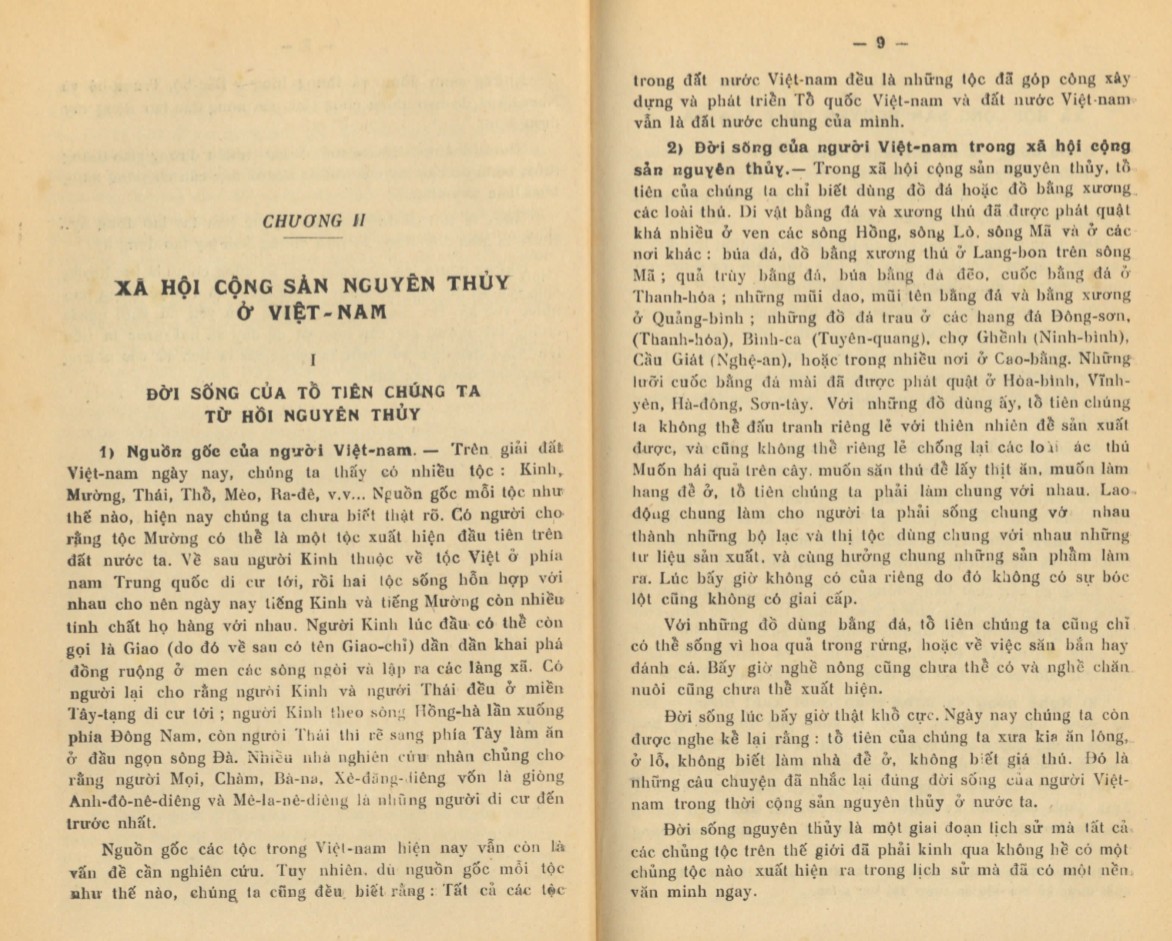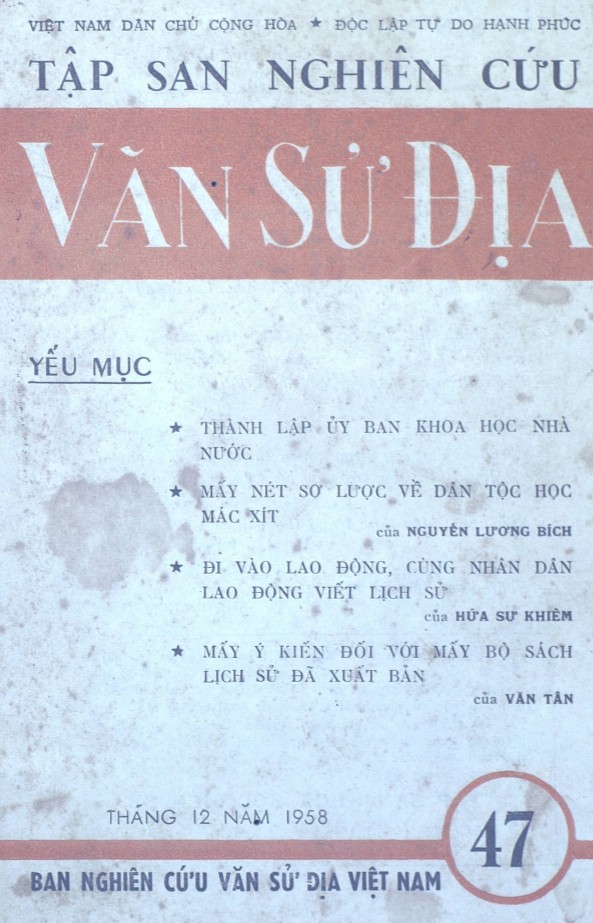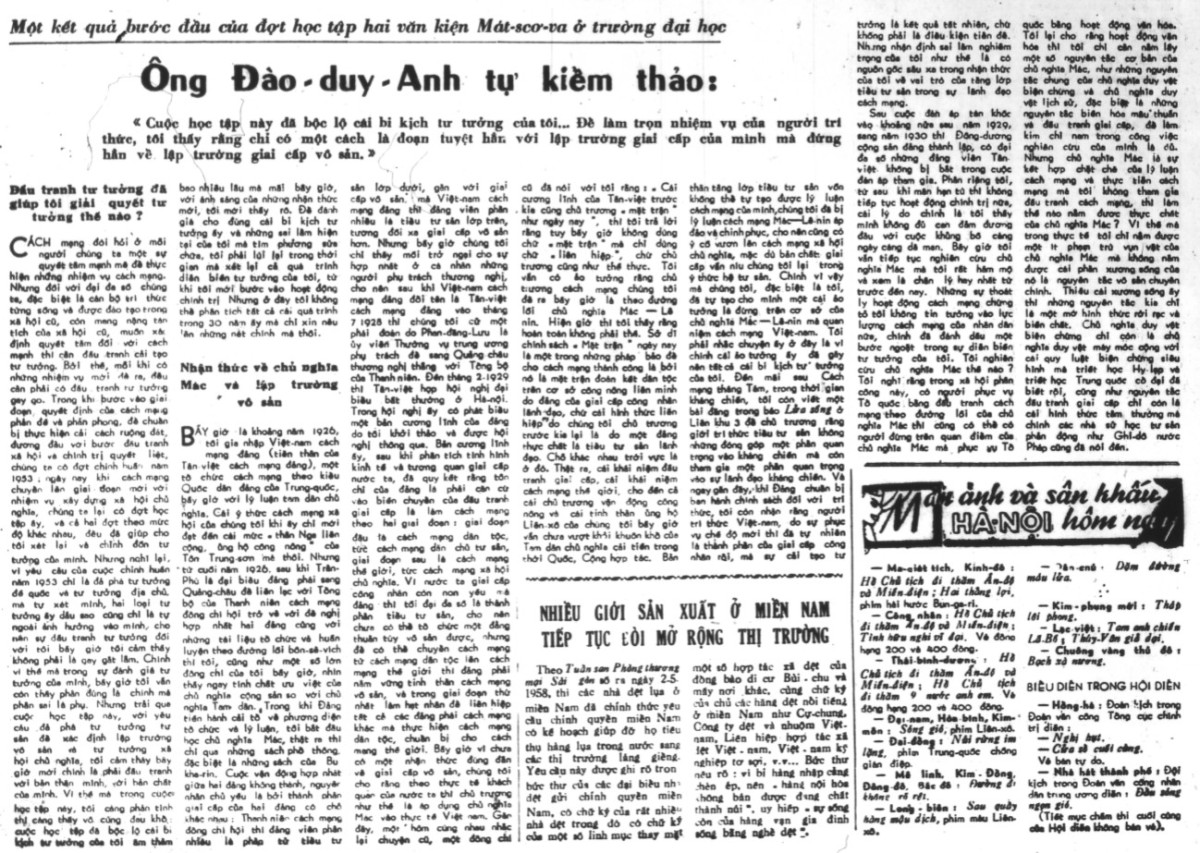The 1950s in North Vietnam witnessed a great deal of debate in the field of historical scholarship about how to produce a postcolonial history for Vietnam. This is a topic that historian Patricia Pelley covered in a book entitled Postcolonial Vietnam: New Histories of the National Past (Duke University Press, 2002).
While that book does a great job of introducing the debates that took place among historians at that time (such as when the nation was formed, how to periodize Vietnamese history, when the period of a slave society existed, etc.), it doesn’t inform us about what was happening “behind the scenes” of those debates.
The more I read the scholarship from that period, the more evident it has become to me that “behind the scenes” of these academic debates were serious political and personal rivalries, the most important of which was between those who wanted to strictly follow Marxist theory in writing about the Vietnamese past, and those who felt that Marxist theory had to be adjusted and adapted in order to explain Vietnamese history.

Đào Duy Anh was the most prominent scholar among those who felt that it was necessary to adjust Marxist theory to get it to fit, and explain, Vietnamese history. By the 1950s, Đào Duy Anh was an established scholar with years of experience and a number of publications to his name.
Đào Duy Anh’s main opponent was a man who wrote under the name of Minh Tranh. Minh Tranh was adamant that Vietnamese history must fit Marxist theory, and that altering Marxist theory was unacceptable.
Unlike Đào Duy Anh, Minh Tranh was not an historian. His real name was Khuất Duy Tiễn. In 1936 he became a communist, and during the First Indochina War he served as a propagandist, journalist and editor for the Việt Minh.
From 1954 until 1963, Minh Tranh was the director and editor-in-chief of the Truth Publishing House (Giám đốc kiêm Tổng Biên tập Nhà xuất bản Sự thật). He was also a committee member of the Central Department of Literary, Historical and Geographical Research (Uỷ viên Ban Nghiên cứu Văn Sử Địa Trung ương) and a committee member of the Department of National Social Sciences (Uỷ viên Uỷ ban Khoa học Xã hội nhà nước).

In 1954, as a member of this intellectual/academic world, Minh Tranh published a book entitled a Draft Brief History of Vietnam (Sơ thảo lược sử Việt Nam). This work closely followed Marxist theory and divided Vietnamese history into periods that had been determined by Marx: primitive communism, slave society, feudalism, etc. This book was also meant to serve as a history textbook for schools in North Vietnam.
Two years later, in 1956, Đào Duy Anh published his History of Vietnam (Lịch sử Việt Nam). Although Đào Duy Anh had incorporated ideas from Engels’ The Origin of the Family, Private Property and the State in his some of his earlier writings, this 1956 work for the most part did not make much use of Marxist theory.
What is more, an interview with Đào Duy Anh was published that same year in the journal Nhân Văn in which he criticized the restrictions that were being placed on scholars at that time, and he particularly criticized “the maladies of doctrinarianism (giáo điều chủ nghĩa), formulism (công thức chủ nghĩa) and personality cults (sùng bái cá nhân).”
This journal was one of two journals (the other being Giai Phẩm) that critiqued government restrictions on artistic and intellectual life following the First Indochina War. The North Vietnamese government cracked down on this critique, an event that is known as the Nhân Văn-Giai Phẩm Affair.

In 1958 Đào Duy Anh’s scholarship was denounced in the journal that Minh Tranh helped publish, Tập san nghiên cứu Văn Sử Địa (Research Journal of Literature, History and Geography]), and Minh Tranh’s Draft Brief History of Vietnam was upheld as an ideal model for the writing of Vietnamese history.
Following this, Đào Duy Anh’s “self-criticism” was published in the official Communist Party newspaper, Nhân Dân. He lost his position at the university where he was working and was transferred to the Institute of History. One of his sons, meanwhile, was “exiled” to Thái Nguyên for a decade.

As for Minh Tranh, something eventually went wrong in his life as well. In 1963, the same year that a collection of his writings was published in the People’s Republic of China, Minh Tranh was sent to study for two years at the Vietnamese Communist Party school, Trường Nguyễn Ái Quốc.
Following that period of study, Minh Tranh was sent to the provinces where he spent the period from 1965 until 1972 working in the Department of Agriculture of the Provincial Committee of Nam Hà (Ban Nông nghiệp Tỉnh uỷ Nam Hà).
For an intellectual who in the 1950s sought to determine how Vietnamese history would be taught in schools. . . this new job was clearly not a promotion.
So what happened to Minh Tranh?

I have no idea. What I do know, is that the Marxist theory that he promoted in the 1950s was abandoned by the early 1970s. Why did that happen?
Pelley doesn’t have a clear answer for this in her book, other than to say that the theory didn’t work so people gave up.
I don’t think the answer to this question can be found entirely at the academic level. There are events that happened at the personal and political levels in the late 1950s and early 1960s that influenced how historians engaged in their work after that, including all of the way up until the present day.

The field of historical scholarship in Vietnam today is an outgrowth of the field of historical scholarship in North Vietnam.
Something went wrong back then, but whatever happened then is not talked about today.
As such, the field of historical scholarship in Vietnam today is like a family that has some “crime” in its background. But since this is a crime that happened “within the family,” the elders in the family have decided not to talk about it.
So the children today don’t know why things are the way they are, but they can probably tell that something is not right. This is because the shadow of the past still casts its darkness over the world of the present.


This Post Has 2 Comments
Minh Tranh actually was one of the first victims of the “campaign against modern revisionism” (chủ nghĩa xét lại hiện đại) in 1964. I quote from my article: “Revisionism in the Democratic Republic of Vietnam: New Evidence from the East German Archives“, in: Cold War History 5, Number 4 (Nov. 2005): 451-477:
“One of the first to be purged was Minh Tranh, director of the ‘Truth Publishing House’ (Nha Xuat ban Su That),
who was accused of having supported the translation and publication of too many ‘revisionist’ books, but his main ‘fault’ seems to have been an article in the Hoc Tap issue of February 1963 that warned against a shift toward Beijing and ‘adventurous manoeuvres’ in South Vietnam, implicitly arguing against sending North Vietnamese
troops to South Vietnam.” (p. 462)
His article was entitled: “Cách mạng miền Nam phải lâu dài, gian khổ, phức tập những nhất định thắng lợi”, in: Học Tập 2/1963: 45-53.
Minh Tranh’s “defeatist” views were criticized directly by General Nguyễn Chí Thanh in his article: “Ai sẽ thắng ở miền Nam?”, in: Học Tập 7-1963: 18-21.
The website of the Khuất family: http://hokhuatvietnam.org/news/vi/news/Doi-tac/ONG-KHUAT-DUY-TIEN-tuc-MINH-TRANH-nha-su-hoc-va-la-mot-can-bo-lao-thanh-cach-mang-29/
does not mention that Minh Tranh was involved in the above-mentioned affair.
Thank you, Martin, for this VERY helpful information!!! I’ve been trying to understand why historiographical approaches changed in North Vietnam at certain times. Certain aspects of Marxist theory (particularly class struggle) stopped being discussed in the 1960s. Certainly the need for everyone to unify behind the war effort must have been one reason for this, but political changes like the one you mention here also must have had an impact.
Thanks again!!!